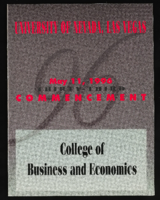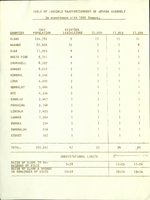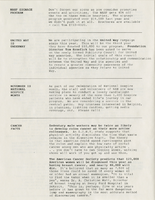Search the Special Collections and Archives Portal
Search Results

Stephen Round oral history interview: transcript
Date
Archival Collection
Description
Oral history interview with Stephen Round conducted by Claytee D. White on October 25, 2017 for the Remembering 1 October Oral History Project. In this interview, Stephen A. Round, a career military contractor, describes his experiences during the 2017 mass shooting in Las Vegas, Nevada. Round mentions moving to Las Vegas in 2013 and in later years staying at the Aria on the evening of October 1. He describes the chaos of the shooting and the 12-hour-plus lockdown at the Aria hotel and casino. The day after the shooting, Round built a memorial around the shooting site and protected it. Once the memorabilia of that first site was taken to the Clark County Museum, he moved to protect the second memorial at the "Welcome to Las Vegas" sign where crosses devoted to the victims had been placed. Along with his preservation of the memorials, Round describes his preparation of a book that was signed by many who visited the sites. Round explains that he was able to see some of the best and worst of humanity during those days of watching and caring for the memorial sites as well as helping any victims, families of the victims, and sympathizers of the Las Vegas 2017 shooting.
Text

Jessica Anderson oral history interview: transcript
Date
Archival Collection
Description
Oral history interview with Jessica Anderson conducted by Claytee D. White on March 7, 2019 for the Remembering 1 October Oral History Project. Anderson begins talking about her early life, family, work history, and the reason why she had moved to Las Vegas, Nevada in 1991. She goes on to talk about the history of Outdoors Nevada where she currently works, and what she was doing the day of October 1, 2017. Anderson recalls how she found out about the shooting, reaching out to friends, and learning more about what happened that night. Anderson talks about the aftermath of the event, how it affected everyone involved, and the healing aspect afterwards. Lastly, she describes the process of creating the Healing Garden, the features of the garden, and the future plans for the area.
Text

Las Vegas General Plan '75: policy guidelines
Date
Description
City of Las Vegas, Nevada general plan, draft copy.
From the introduction: "This is a document of policies. These policies are in the form of recommendations to the City of Las Vegas for planning policies in the areas of: Population and Economic Development, Land Use, Housing, Community Facilities, Conservation, Transportation, Parks and Recreation, Visual Environment, Implementation."
Text

Nanyu Tomiyasu interview, March 11, 1978: transcript
Date
Archival Collection
Description
On March 11, 1978, Sosuke Miyazawa interviewed Nanyu Tomiyasu (b. May 28, 1918 in Las Vegas, Nevada) about his family’s farm and their legacy as one of the pioneering families of the city. Tomiyasu begins by talking about what brought his family to Las Vegas, the city’s abundant water reservoir and his father’s farm. In particular, Tomiyasu discusses his father’s experiments with farming as one of the city’s early farmers, the transition into nursery farming and Japanese gardens. Moreover, he discusses his siblings, the local schools, their great quality, the successful students the city produced and the growth of school populations. Tomiyasu describes the large Japanese population and the Union Pacific Railroad that many of them worked on. He ends by discussing the change in architecture within the city, such as where old buildings stood and what they are used for now, the first Episcopal Church and the old Mormon Fort.
Text

University of Nevada, Las Vegas (UNLV) College of Business and Economics 33rd commencement program
Date
Archival Collection
Description
Commencement program from University of Nevada, Las Vegas Commencement Programs and Graduation Lists (UA-00115).
Text

Corey Nyman oral history interview: transcript
Date
Archival Collection
Description
Oral history interview with Corey Nyman conducted by Claytee D. White on May 04, 2018 for the Remembering 1 October Oral History Project. In this interview, Nyman recalls his high school and college experiences, and working in Las Vegas, Nevada as a young adult. On October 1, 2017, Nyman attended the Route 91 Country Music Festival with his brother and a group of friends. They enjoyed the concert from the Red Bull VIP suite, which Nyman felt helped them escape bullets as he and his friends helped others escape. About three hours after escaping the venue, they arrived at Tropicana Avenue and Koval Lane where their ride picked them up. The driver was one of the last allowed into the area under the airport underpass. Nyman discusses his feelings since the shooting, and states that he loves the city and has made it his home despite the traumatic events of the night.
Text

Bryan Chan oral history interview: transcript
Date
Archival Collection
Description
Oral history interview with Bryan Chan conducted by Vanessa Concepcion, Cecilia Winchell, and Stefani Evans on October 18, 2021 for Reflections: The Las Vegas Asian American and Pacific Islander Oral History Project. Bryan Chan discusses his life growing up in California, his family's migration stories to the United States, and his education. He discusses his appearance on a reality television show which led to becoming a singer for boy band LMNT. Bryan talks about his entertainment career, including his move to Las Vegas to sing and host for the Chippendales show at the Rio Hotel and Casino. He also shares insight into his family's traditions and his favorite foods that his father and grandmother cooked. Subjects discussed include: chain migration; Chippendales; giglife; virtual events; traditional foods.
Text

Katrina Sandigo oral history interview: transcript
Date
Archival Collection
Description
Oral history interview with Katrina Sandigo conducted by Nathalie Martinez and Barbara Tabach on August 28, 2020 for the Latinx Voices of Southern Nevada Oral History Project. Katrina talks about her family's history and her grandfather's immigration to the United States from Nicaragua. She discusses her education and her time spent studying at the University of Nevada Las Vegas (UNLV) and her work with the Clark County School District (CCSD). She is currently the Education Director for Nevada's Anti-Defamation League (ADL). Katrina also shares her religious faith and how she is active in the Jewish community of Las Vegas.
Text

Legislative counsel bureau reports, sample apportionments, county populations and final apportionment for legislative reapportionment, 1965
Date
Archival Collection
Description
Group of documents dealing with the legislative reapportionment of the Nevada State Assembly based on population distribution.
Text

